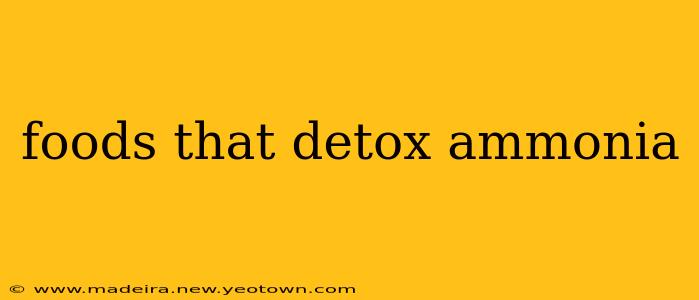Ammonia. The very word conjures images of harsh chemicals and unpleasant odors. But the truth is, our bodies naturally produce ammonia as a byproduct of protein metabolism. While small amounts are handled efficiently, an overload can lead to serious health issues. So, how can we naturally support our bodies in processing this waste product effectively? The answer lies, in part, in the foods we choose. This isn't about a "detox" in the trendy sense, but rather about nourishing your liver, the primary organ responsible for ammonia processing.
What is Ammonia and Why is it Important to Process it Properly?
Before we delve into specific foods, let's clarify what ammonia is and why its effective processing is crucial. Ammonia is a toxic compound produced when your body breaks down protein. Your liver converts it into urea, a less toxic substance, which is then excreted through urine. When your liver isn't functioning optimally, or if you have an excess of ammonia, it can accumulate in the bloodstream, leading to a condition called hyperammonemia. This can manifest in various symptoms, ranging from fatigue and nausea to more serious neurological problems.
What Foods Help Your Body Process Ammonia?
The key to supporting your liver's ammonia processing lies in a balanced diet rich in nutrients that aid liver function and support overall health. Think of it as providing your liver with the tools it needs to do its job efficiently. These foods aren't magic bullets; they work synergistically to improve overall bodily function.
1. High-Protein Foods (but with a twist!)
This may seem counterintuitive, since protein breakdown creates ammonia. However, choosing high-quality protein sources is crucial. Complete proteins, found in foods like:
- Eggs: Packed with essential amino acids, crucial for various bodily functions, including liver health.
- Lean Meats (Chicken, Fish, Turkey): Provide protein without excessive fat, which can overburden the liver.
- Legumes (Lentils, Beans, Peas): Excellent sources of plant-based protein and fiber, supporting overall digestive health.
Choosing these sources ensures your body has the building blocks it needs while minimizing the strain on the liver. Remember, moderation is key – consuming excessive protein can still overwhelm the system.
2. Foods Rich in Arginine
Arginine is an amino acid that plays a vital role in the urea cycle, the process by which ammonia is converted to urea. Good sources include:
- Nuts and Seeds (Almonds, Walnuts, Sunflower Seeds): A tasty and convenient way to boost your arginine intake.
- Poultry: Another great source of this essential amino acid.
- Fish: Certain types of fish are particularly rich in arginine.
3. Foods Rich in Antioxidants
Antioxidants help protect liver cells from damage caused by free radicals, which can impair liver function. Excellent antioxidant sources include:
- Berries (Blueberries, Strawberries, Raspberries): Bursting with vitamins and antioxidants.
- Dark Leafy Greens (Spinach, Kale): Rich in vitamins, minerals, and protective compounds.
- Cruciferous Vegetables (Broccoli, Cauliflower, Cabbage): Known for their cancer-fighting properties and liver-supporting benefits.
4. Foods Rich in Glutamine
Glutamine, another amino acid, plays a significant role in ammonia transport and detoxification. Good sources include:
- Beef: Provides glutamine alongside other essential nutrients.
- Dairy Products: Especially important for those who are not vegan or vegetarian.
- Eggs: Another excellent source.
5. Hydration is Key!
Drinking plenty of water is vital for flushing out toxins, including urea, from the body. Aim for at least eight glasses of water per day.
What about specific diets for ammonia detoxification?
There isn't a single "detox diet" specifically for ammonia, as this approach risks nutritional deficiencies. Focusing on a balanced diet rich in the foods mentioned above, along with maintaining a healthy lifestyle, is far more effective and sustainable.
How Can I Tell if I Have a Problem with Ammonia Processing?
If you suspect issues with ammonia processing, it's crucial to consult a healthcare professional. They can conduct appropriate tests and determine if there's an underlying medical condition that requires treatment. Symptoms like persistent fatigue, nausea, confusion, or changes in mental state warrant immediate medical attention.
Conclusion: Nourishing Your Liver for Optimal Ammonia Processing
Supporting your liver's ability to process ammonia is not about drastic cleanses or restrictive diets. It's about providing your body with the nutrients it needs to function optimally. By incorporating a variety of nutrient-rich foods into your daily diet and maintaining a healthy lifestyle, you can naturally support your liver and ensure the efficient processing of ammonia. Remember, always consult with a doctor or registered dietitian before making significant changes to your diet, especially if you have any pre-existing health conditions.

